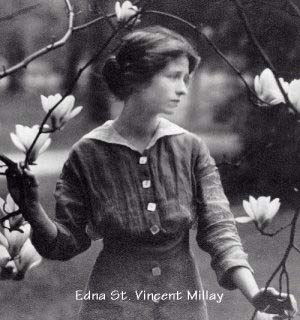Edna St Vincent Millay (1892-1950)
Edna St Vincent Millay was a poet who was highly appreciated in the first half of the century. Renascence and Other Poems was written in 1917, while she was still at Vassar. The second volume of poems, A Few Figs from Thistles (1920) established her as a poet and showed her rebellion against the moral standards of her time. Her third volume The Harp-Weaver and Other Poems received the Pulitzer Prize in 1923. Her later work showed political and social awareness. She enlisted, for instance, in the Sacco and Vanzetti case, and she took part in mass meetings held to call attention to a cruel denial of justice. She is mentioned in the Autobiography with her husband Eugene Boissevain as 'two princely creatures' 'who exercise a diverse, and yet in some mysterious way a kindred enchantment', but, as John Cowper remarks, they were closer friends to Llewelyn Powys and to Arthur Ficke than to him.
The theme of all her poetry is the search for the integrity of the individual spirit... Her unique effort was to perform the miracle of creation in reverse. The universe already made pressed its weight on the sensibility, the aptitude for awareness, of one individual: "Infinity/ Came down and settled over me..." (Edna St. Vincent Millay, by James Gray, Univ. of Minnesota Press.)
|
For my omniscience paid I toll
In infinite remorse of soul.
All sin was of my sinning, all
Atoning mine, and mine the gall
Of all regret...
(From Renascence)
|
|
It was now that there fell into my hands, for the first time, the poetry of Edna St Vincent Millay. There was something about these lyrics, these snatches of song, contained in the slim black volume called Renascence, that amazed and enchanted me. They seemed to express a spirit at once daring and sensitive, and to possess a beauty which, however slight, was separate and authentic as only true poetry can be.
(...)
Her appearance in no way disappointed me. She was dainty with a daintiness that can only be compared with the daintiness of Queen Anne's lace or with the daintiness of a spider-web gossamer such as I have seen decorating the leaves of dahlia flowers on a September morning.
(Llewelyn Powys The Verdict of Bridlegoose)
|
|
|
|
